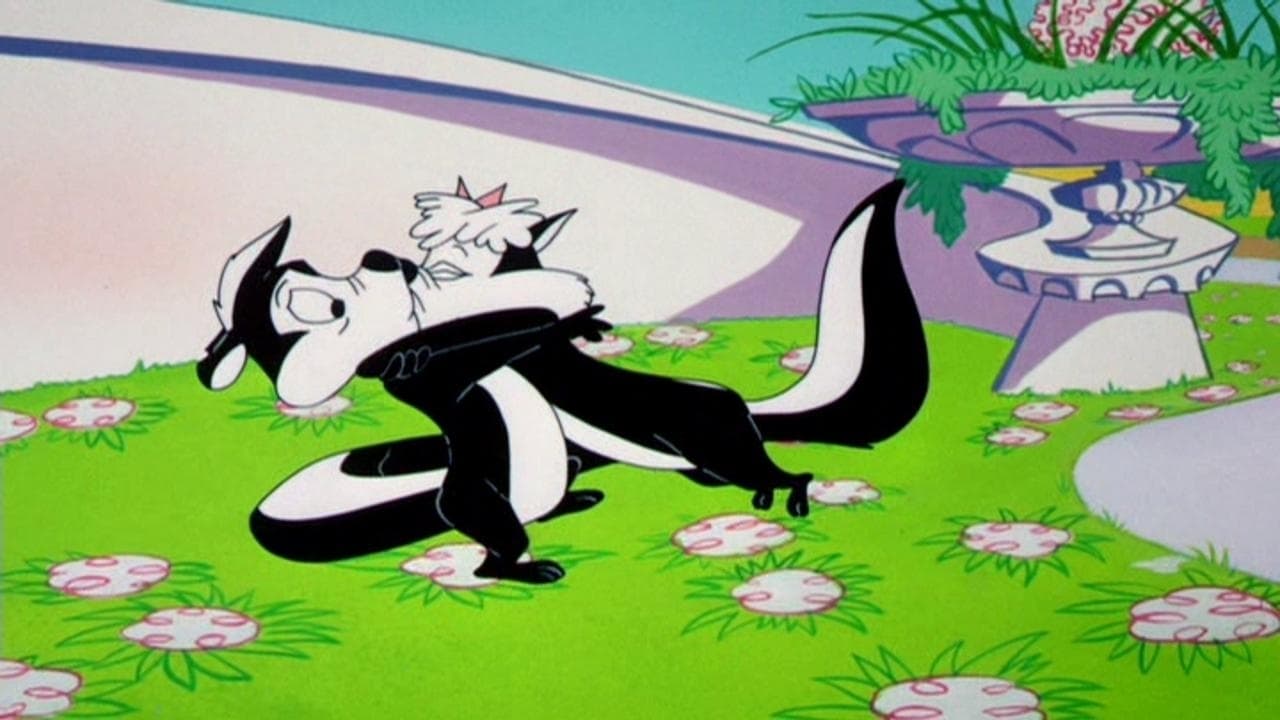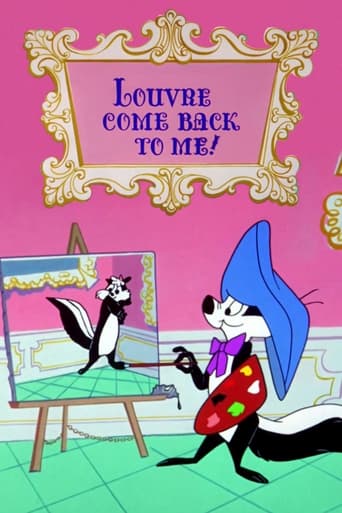ClassyWas
Excellent, smart action film.
Siflutter
It's easily one of the freshest, sharpest and most enjoyable films of this year.
Mehdi Hoffman
There's a more than satisfactory amount of boom-boom in the movie's trim running time.
Scotty Burke
It is interesting even when nothing much happens, which is for most of its 3-hour running time. Read full review
Edgar Allan Pooh
. . . that some swindlers have persuaded a gaggle of rich French folks to mount in a Paris tourist trap during this Warner Bros. animated short from the early 1960s, LOUVRE COME BACK TO ME! That cheesy "American Gothic" canvas depicting a geezer farm couple with a pitchfork? Gone in the blink of an eye. Joan Miro's melted desert watches? Dust-to-dust. That ancient Greek Venus of Milo reject discarded because her flimsy arms broke off? Back on the trash heap. "Discus Thrower?" Discard; tossed. After Pepe's invalidated these and many other infamously ballyhooed "another man's treasure is a stinker's trash," he offers to "settle down and become a traveling salesman." What will Pepe peddle, you might wonder. I think the short answer is: Art. Masterpieces by under-priced titans such as Thomas Kincaid and that Big Eyes guy, Walter Keane--things for which the Louvre is sorely lacking. Maybe, as a sop to the high-brow crowd, Pepe will sneak in an occasional Norman Rockwell "Saturday Evening Post Cover" (torn off and perhaps framed from a library magazine discard, of course--NOT a gussied up on expensive canvas!). But for every Rockwell, Pepe will be sure to find room for TWO Banksky's!
TheLittleSongbird
I have been a huge Looney Tunes for as long as I can remember. And I do like Pepe LePew and his cartoons, even if it was the sort of humour that might go over the heads of any child watching for the first time. Louvre Come Back to Me as with all the Pepe cartoons has much to like, but it is possibly my least favourite of the series. The animation has had much more colour and finesse before, some of it was on the gaudy side and some of it seemed rushed through. This is also a Pepe cartoon that is funnier, like the very early ones, from a visual gag point of view rather than verbally, the latter being part of the fun and charm of the best of Pepe. By all means there are still some good funny lines, but generally they have been more frequent and witty and compared to the quite bold innuendos before it seemed somewhat tame. And then Louvre Comes Back has the jealous boyfriend stereotype, that just feels as though it's just there with no spark and it does slow things down for me. However, the music is wonderful, full of jaunty, elegant and beautiful sounding themes. The visual gags are good, the facial expressions at the beginning are priceless. And the imaginary duel, which takes up most of the duration, is one of the most memorable scenes of any of Pepe's cartoons. Pepe is an amusing and very endearing character, and voiced wonderfully as usual by the one and only Mel Blanc. In conclusion, worthy if slightly disappointing. 7/10 Bethany Cox
Lee Eisenberg
And so, Pepe Le Pew - one of Chuck Jones's personal stars for many years - departs the silver screen. And "Louvre Come Back to Me!" is a worthy departure. As is the case in most of Pepe's cartoons, it begins with a female cat (usually called Penelope, although her name sometimes changes) having her back painted white. To be certain, here she deliberately does it to avoid a gaggle of dogs. But sure enough, Pepe - after having traipsed through Paris and unwittingly grossed everyone out with his body odor - catches sight of her. He chases her into the Louvre. But here, Jones throws a wrench in the works. You see, this supposed belle femme skunk already has a lover...and the guy is ready to fight Pepe for her. So, Pepe puts on a litany of dueling histrionics, even feigning death at one point...and meanwhile his rival is holding his own breath and turning several colors! Anyway, with the Looney Tunes having passed their heyday, it was good that the directors were coming up with good ways to end the characters' careers (Porky Pig left the screen in 1961; Elmer Fudd and Pepe Le Pew left in 1962; Marvin the Martian and Foghorn Leghorn left in 1963; Bugs Bunny, Yosemite Sam and Tweety all left in 1964; Sylvester left in 1965; Daffy Duck, Speedy Gonzales and Road Runner/Wile E. Coyote had all left by the end of 1968; and Warner Bros. ceased all animation in 1969).All in all, Pepe remains an important part of American popular culture. In other words, that'll never be all, folks. Like I said earlier, this was a good end for him. It wouldn't surprise me if the final sequence irked the world's art buffs.PS: this cartoon got included in the 1983 compilation film "Daffy Duck's Movie: Fantastic Island".
Angel-Marie
This cartoon is probably the only Pepe Le Pew cartoon that I try to avoid watching. To me, it didn't seem to have the same delicious sexual innuendo and colorful scenery that made the cartoons stand out (and draw people away from the fact that Jones used the same love chase gag for each cartoon short). It did have one good risque scene: the one where the painted cat is up in the air and is headed towards Pepe. Pepe backs up and pretends to catch her like a baseball until the cat falls into his arms, having her lips pressed against his. Pepe sees this and asides to the audience, "How impetuous can you get?" That was the only good laugh I got from this lackluster end of an otherwise verbally humorous series.

